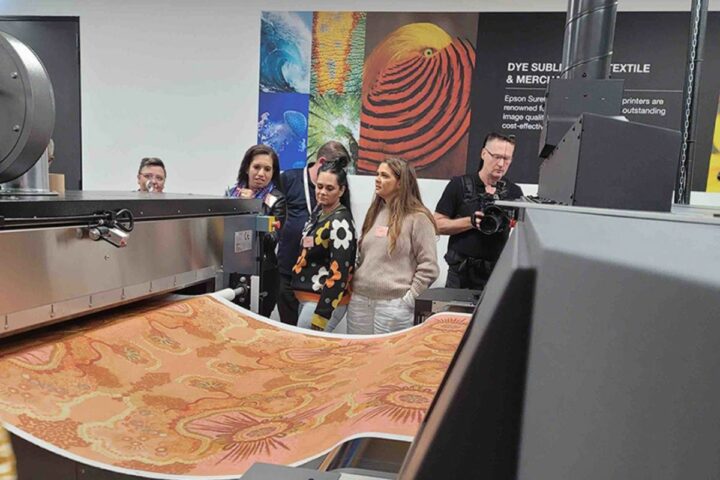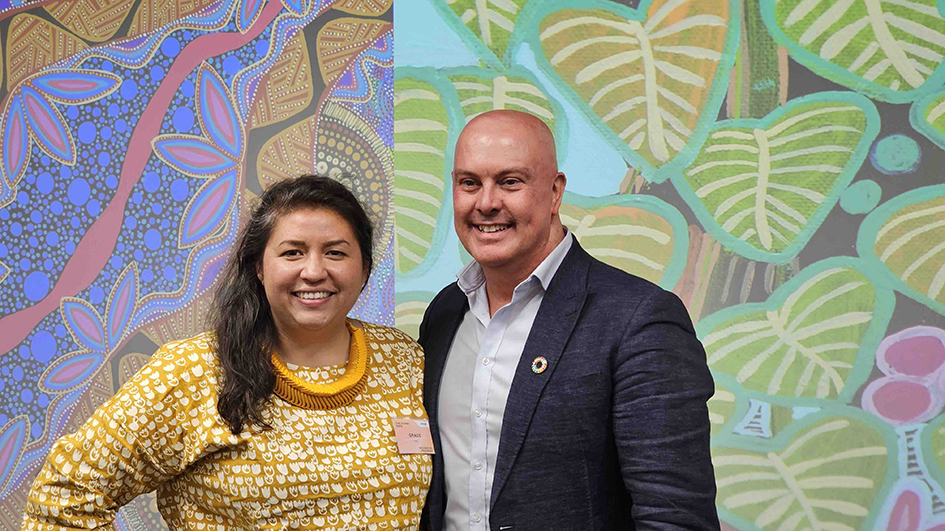Epson signs landmark technology and sustainability partnership with First Nations Fashion + Design, promoting the growth of the Indigenous fashion sector.
Epson has signed a landmark technology and sustainability agreement to support First Nations Fashion + Design (FNFD), the NFP Indigenous Corporation whose goal is promoting the growth of the Indigenous fashion sector.
“We are very excited to be working with Grace and her team at FNFD to promote the growth of Indigenous fashion and provide new skills and knowledge to help First Nations designers tell their stories through the art of fashion using Epson digital printing technologies,” said Craig Heckenberg, Epson Australia MD.
A big part of the discussion around a potential partnership between Epson and FNFD came from the fact that Epson had just launched their Monna Lisa ML-8000 direct-to-fabric printer, a unique product FNFD had been seeking for some time.
“We also discussed the Incubator Program we have developed with THE ICONIC,” said Grace Lillian Lee, FNFD founder and chairperson.
FNFD x THE ICONIC Incubator Program winners watching the Epson Monna Lisa ML-8000 print out their designs at the Epson Experience Centre in Yennora
“After a trip to the Epson Experience Centre, it became very clear that a partnership between Epson and FNFD could not only support the Incubator Program but Epson products such as the ML-8000, technology and expertise could support the overall growth of FNFD and our designers. Our organisations, objectives and values are incredibly well aligned and this is an ideal partnership.
FNFD were looking for a long-term technology partner who shared the same values and was looking to contribute to FNFD’s objectives and outcomes.
“Along with partners and partnerships like the one we now have with Epson, the FNFD program provides a national platform for grassroots art collectives and artists to showcase Indigenous-led arts, dance and fashion.
Lee said, “FNFD’s vision is to partner with organisations that can support First Nations designers, businesses and communities in the fashion industry in order that they can grow and develop their skills and businesses to become commercially self-sufficient. Then allow the value they have created to flow back into their communities – thus creating a self-supporting ecology.”
The first places in the aforementioned THE ICONIC x FNFD Incubator Program were recently awarded to Gunggandji designer Elverina Johnson of label Pink Fish, Mt. Isa designers Dale Bruce, Cheryl Perez, Glenda McCulloch and Jaunita Doyle of label Myrrdah and Kuranda based designer Briana Enoch of label Jarawee.
Over the next eight months, the designers will participate in workshops, events and experiences developed by a range of industry experts and educators such as Epson, The Hanes group and Bonds with ongoing feedback from the Indigenous creative community.
“Our partnership with FNFD is built on a shared vision of promoting cultural and economic sustainability,” added Heckenberg.
 “Through directly supporting inclusive and authentic initiatives such as THE ICONIC x FNFD Incubator Program, we will add value by providing access to the world’s most advanced textile printing technologies. We will also share new skills and knowledge to help First Nations designers understand how they can digitally translate their designs into high quality fashion.”
“Through directly supporting inclusive and authentic initiatives such as THE ICONIC x FNFD Incubator Program, we will add value by providing access to the world’s most advanced textile printing technologies. We will also share new skills and knowledge to help First Nations designers understand how they can digitally translate their designs into high quality fashion.”
FNFD’s founder added that having Epson as a partner gave them access to experts in the industry who can create new opportunities, and boost skill development and industry engagement.
Lee commended Epson’s commitment to helping further sustainability in fashion by acknowledging that their printers offer on-demand solutions that reduce waste and overproduction.
“Sustainability is central to our partnership with FNFD. Epson is committed to playing its part in helping the world achieve a more sustainable future by using our efficient, compact and precision technologies to connect people and help industry reduce its impact of the environment,” said Heckenberg.
“FNFD along with Epson also aims to promote sustainable, ethical trading and best practice when working with, purchasing or licensing Aboriginal and/or Torres Strait Islander arts, prints, designs, and cultural products,” added Lee.












